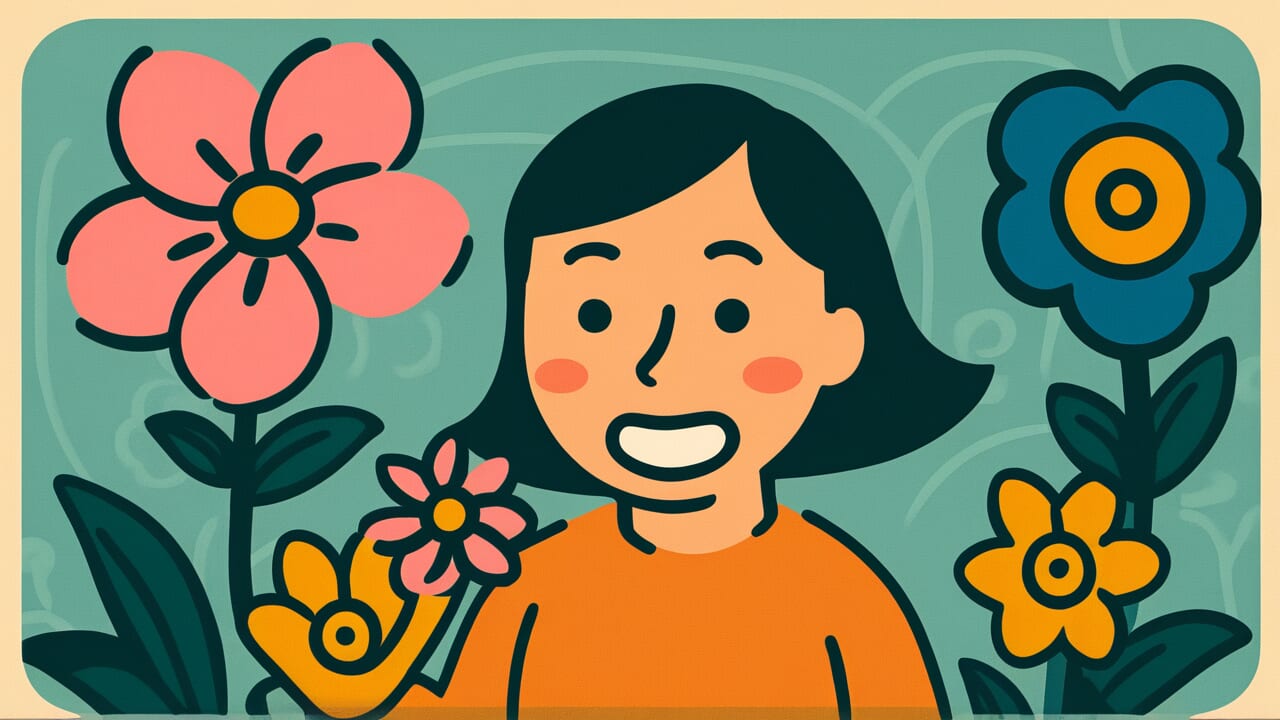How to Read “Not saying is the flower”
Iwanu ga hana
Meaning of “Not saying is the flower”
“Not saying is the flower” means that sometimes it’s more beautiful and things work out better when you choose not to say something, rather than speaking everything out loud.
This proverb applies to situations where speaking the complete truth or your honest feelings doesn’t necessarily lead to good results.
For example, even if you notice someone’s flaws, not pointing them out can keep the relationship smooth.
Also, when you choose not to talk about your own achievements or efforts, you can actually maintain your dignity and earn higher respect from others.
Today, we often emphasize the importance of communication and encourage putting everything into words. But this proverb teaches us a different kind of wisdom.
There’s a beauty that gets protected by not speaking, and silence has its own power.
Instead of revealing everything, leaving some space creates room for imagination. This expression shows us that such restraint can actually create deeper meaning.
Origin and Etymology
The exact origin of “Not saying is the flower” isn’t clear from historical documents. However, we can learn interesting things from how this expression is structured.
In Japanese classical literature, the word “flower” meant more than just a plant. It was frequently used as a metaphor for beauty, elegance, and refined taste.
In Heian period poetry, flowers symbolized visible beauty. At the same time, they expressed emotions that couldn’t be put into words.
The “flower” in this proverb likely continues that tradition. A flower is beautiful precisely because it blooms silently.
If a flower started talking about its own beauty, it would lose its charm. This idea was then applied to human behavior.
Japanese culture has long valued concepts like “ishin-denshin” (heart-to-heart communication) and “sassuru” (sensing without words). Understanding each other without full explanations has been considered a virtue.
This cultural background likely influenced the creation of this proverb.
Documents from the Edo period contain this expression. This suggests it was already widely used among common people by that time.
The beauty of not speaking is compared to a flower, something familiar and universal. This proverb captures the essence of Japanese aesthetic sensibility.
Usage Examples
- I’m curious about her past, but not saying is the flower, right?
- Rather than bringing up that old mistake, not saying is the flower would be better for both of us
Universal Wisdom
“Not saying is the flower” has been passed down through generations because it contains deep insight into human nature.
Humans are creatures with language. But we’re also beings who get hurt by words and destroy relationships through words.
We want to believe that speaking all truths is justice. Yet humanity has learned through experience that revealing everything can cause us to lose something important.
This proverb shows us the positive value of silence. It’s not just passivity or cowardice.
The choice not to speak is consideration for others. It’s wisdom to protect relationships. Sometimes it’s a way to maintain your own dignity.
In human relationships, putting everything into words and making everything clear doesn’t always create deep bonds.
Rather, the space left by not speaking, the room for imagination, and the sense of mystery can give relationships greater depth.
This proverb also offers insight about self-expression. People who act quietly often earn more respect than those who loudly talk about their achievements and good deeds.
This happens because humans are creatures who find beauty in humility and modesty.
The dignity born from not speaking is another universal value that human society has discovered.
When AI Hears This
Claude Shannon, the founder of information theory, measured information value by “the amount of uncertainty reduction.” In other words, the more you clarify something ambiguous, the more valuable the information becomes.
But “Not saying is the flower” demonstrates a phenomenon that goes completely against this principle.
Let’s think about a concrete example. When you only hear “This person apparently did something amazing in the past,” countless possibilities expand in your mind.
Maybe they were an Olympic athlete, saved a major company, or rescued someone’s life. This state is what information theory calls “high entropy” – maximum uncertainty.
But the moment someone says specifically “They once won a local amateur baseball tournament,” the possibilities collapse to one. Entropy becomes zero, and most people feel disappointed.
Here’s an interesting paradox. The receiver’s satisfaction is actually higher when information is scarce.
This is because the human brain automatically fills in missing information with “the optimal content for themselves.”
In other words, silence becomes a device that creates different “best answers” for each receiver.
In Shannon’s theory, information flows one way from sender to receiver. But “Not saying is the flower” represents a special case where information amplifies on the receiver’s side.
The gap itself activates the value-creation engine called imagination.
Lessons for Today
“Not saying is the flower” teaches you about the active power of silence.
This wisdom shines even brighter in an era when you can share anything on social media.
Now that sharing everything has become normal, you need the courage to choose not to speak.
The urge to show off your achievements, the desire to point out others’ mistakes – holding back these feelings protects your dignity.
At work, at home, and with friends, don’t say everything you want to say. Have the kindness to swallow words for the other person’s sake.
This isn’t endurance. It’s an expression of caring love.
The same applies to yourself. You don’t need to talk about everything you’re working on or trying hard at.
Acting silently can sometimes communicate your true worth to others better than words.
Words are powerful tools, but use them too much and they cut like knives. Sometimes close your mouth and find beauty in silence.
Having that kind of composure is the mark of a mature adult.



Comments